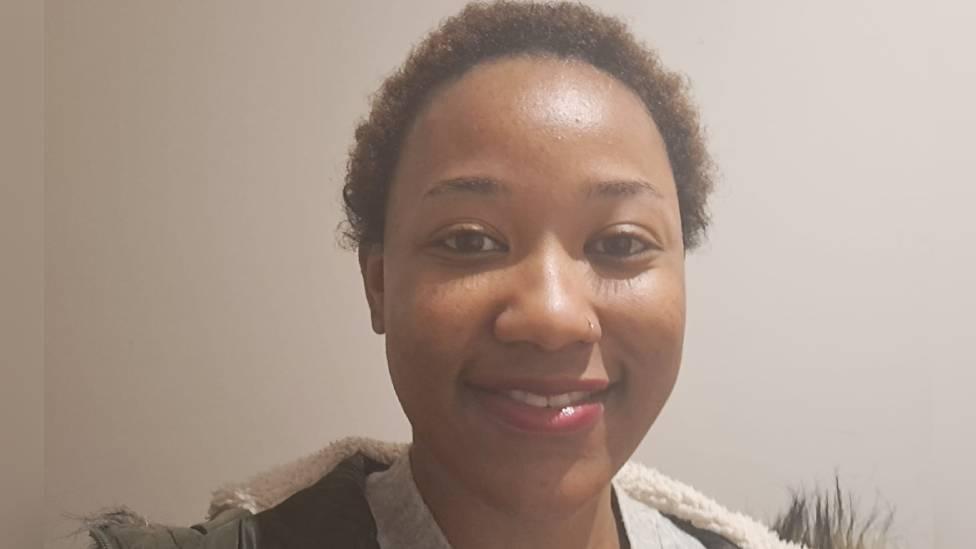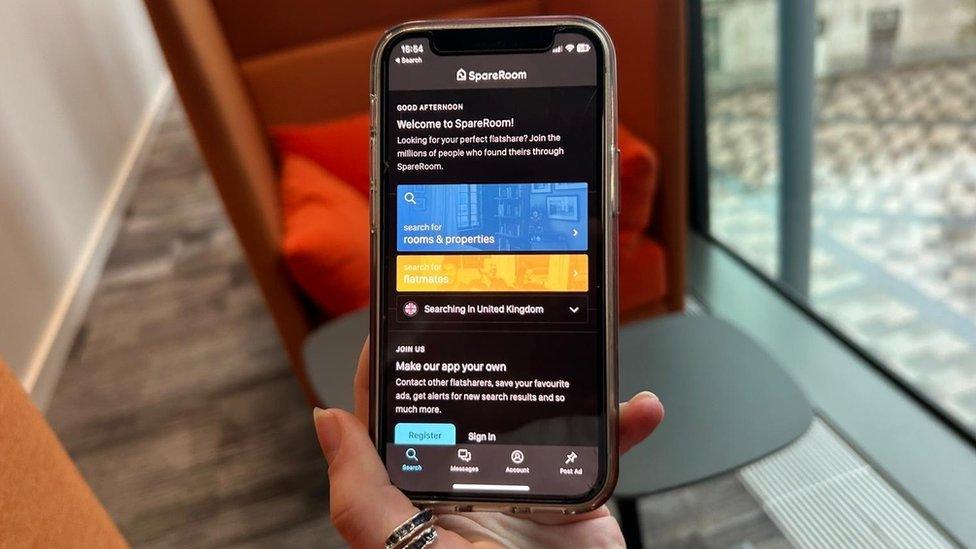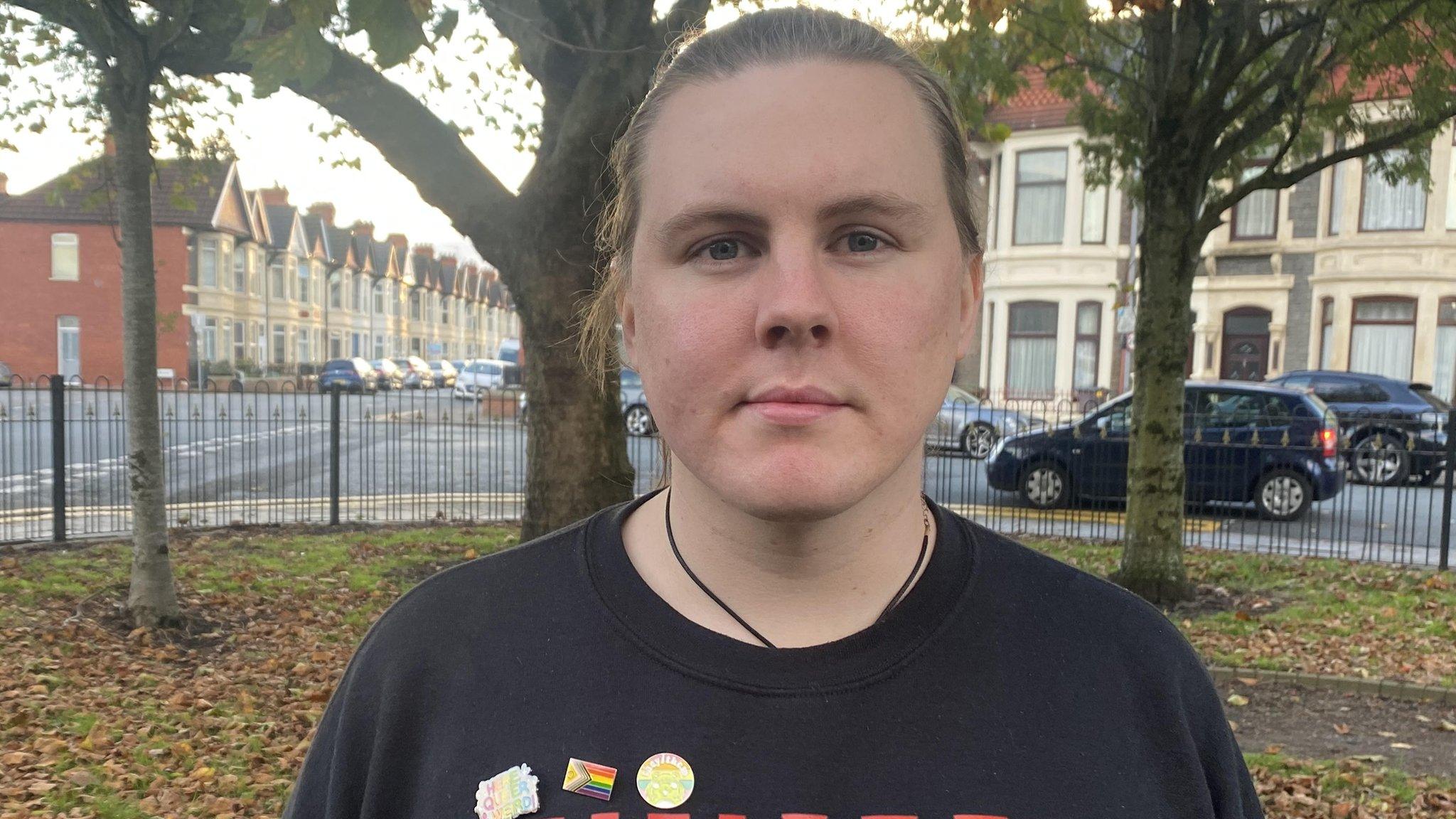Cost of living: Women feel trust was 'violated' on housing app
- Published

Megan Ratcliffe said desperation can make people take risks
Women say they fear they are more vulnerable to being taken advantage of when seeking budget rents on an app because of the cost of living crisis.
One woman moved into a house where the landlord did not tell her he was taken to court by an ex-tenant for assault.
A women's charity and a landlord group both say safety is a priority and have condemned inappropriate behaviour.
SpareRoom said verification services are available, its teams check room ads and the system monitors messages.
The app, which is popular with millennials and Gen Z, lets people find flatmates and rooms easily without agent fees.
Both landlords, agents and former flatmates can advertise rooms - they simply have to select an address.
The platform's website said it had more than two million visitors every month across the UK.
Figures for 1 February showed that across the UK there were 171,858 active renters and 31,727 room ads.
Out of this, for the same date there were 4,307 people in Wales actively looking on the app for a room and there were 539 room ads relating to properties across Wales.
Many women using the app told the BBC they had no problems with other users and had not experienced anything inappropriate.
However, Marta, 34, from Cardiff, said the competition for housing "clouds your judgement".
She was trying to move from Manchester when she was "hit on" by a man on the app.
Among other messages, the man complimented a tattoo on her chest, behaviour she felt was "inappropriate" on a room-finding app.
She "assumed it was a safe space" and said her trust was "violated".
The 34-year-old said these messages were "annoying and upsetting" for women but "also not fair on men" as it made her "less trusting towards all men".
She said she had previously rented and lived with men from the app, and had no problems but her recent experience would put her off in the future.

Marta said one potential flatmate made personal remarks about her appearance
"The cost of living did impact me, particularly when I was looking for a temporary room," she said.
"I couldn't be fussy, I had to go for what I could afford."
Marta said women have "enough to worry about" when they "need a roof over [their] head".
She said being a woman and having to watch out for "predators" has limited her options.
'Massive lesson'
Kiera Harris - not her real name - felt "trapped" and "violated" after discovering her male live-in landlord was accused of assault by a previous tenant.
Ms Harris, who's in her 40s, used SpareRoom to move closer to her job.
She felt comfortable moving in as she had met the landlord and seen the property.
It "seemed perfectly normal" at first, she said.
One day her live-in landlord came home celebrating after winning a court case in which a previous tenant accused him of assault.
She said she was unsure whether it was a criminal or civil charge and was too uncomfortable to ask.

SpareRoom said they have a team of moderators who check ads and content
"I know he was acquitted but the fact he didn't disclose it when it was still pending made me feel uncomfortable."
She said she was "speechless" when she found out.
Although there were locks on the doors, he had a key which unlocked them all which made her feel vulnerable, she said.
"It was a massive lesson to me to ask more questions before you enter into an agreement with someone," she added.
Ms Harris moved out of the property after several months and returned to her home city.
She said vulnerable women, such as survivors of domestic abuse, may not have the "tool set" to get themselves out of the situation.
'I was right to be cautious'
Megan, 26, from Cardiff, said she had taken risks that she would not normally take due to the cost of living crisis.
She had arranged to meet all her potential new housemates when travelling from north Oxfordshire for a viewing. When she arrived only one man was there.
"He showed me around the house and stepped into unoccupied bedrooms with me," she said.

Megan Ratcliffe said she has not been put off the app
She said he was "lovely" but that the experience made her uncomfortable because she would never enter a stranger's home alone.
"I think I was right to be cautious," she added.
Kaitlyn Smith, 22, was moving from Caerphilly to Newport but felt "in danger" after receiving messages from a man with an account but no property ad.
"It just got really uncomfortable and strange. I wasn't sure what was going on," she said.
The messages felt "threatening" because he kept asking her to come to the house, but admitted he was not the landlord and only a tenant.
"I felt very fearful for my safety. I wasn't sure what kind of situation I'd be stepping into," she added.

Kaitlyn Smith said she felt there should be more safety precautions on the app
Ffion James - not her real name - was looking to move from Manchester to Cardiff and said men made her feel "uncomfortable" on the app.
She said she saw lots of male live-in landlords advertising for female-only tenants.
The app recommended adding a selfie to encourage responses but once she did she received more messages from older men.
This made her feel "unsafe" and "wary" of everyone else on the website, she said.
Ms James said she was concerned she would be left without a roof over her head if she did not respond to these messages.
"It makes me feel scared that I would have had to put my safety at risk to get a room," she added.
'Gut instinct'
Sophie Weeks, head of public affairs and communications at Welsh Women's Aid, said: "The cost of living crisis and the housing crisis are intrinsically linked, and each exacerbates the other."
She said women's choices were being stripped away due to the "current housing and financial climate".
A person's gut instinct might make them feel a house isn't safe, but it was not always possible to turn it down, she said.

Sophie Weeks says women's choices are being stripped away by the cost of living crisis
Online sexual harassment is an "epidemic problem", Ms Weeks said. "Receiving those sort of messages through these apps is a form of that."
She added that it was easy to "belittle or downplay" the effect of harassment when overwhelmed with other pressures.
"It's important to remember that those messages are not OK. This behaviour is not acceptable."
The National Residential Landlord Association said: "It can never be appropriate for a householder or landlord to take advantage of their position to prey upon individuals made vulnerable by their need to find a home.
"There is no excuse for inappropriate behaviour from those offering accommodation to rent.
"Tenants and prospective tenants must be able to feel safe and secure at every stage of the application and renting process. This is especially important as more people are sharing homes in order to cut costs."
It added: "Anyone who is made to feel uncomfortable when searching for a home or has experienced inappropriate behaviour or had illegal demands made of them, should report these to the platform or service advertising the property and if appropriate the police".
A spokesperson for SpareRoom said "almost all" interactions it had seen were "respectful" but it had had to take action in the past.

Users are advised to message on the app to ensure any inappropriate or suspicious behaviour can be picked up by their system
It said it was unable to use the Disclosure and Barring Service (DBS) to check users' criminal records as it did not have the authority.
The company said a rating system would be impossible due to medium and long-term tenancies limiting the number of people rating.
Users can be reported whether they have an advert or not, directly from the message or to the customer service team.
The app said it can request proof of the right to advertise the property.

SpareRoom suggests users keep themselves safe with the following advice:
If you're worried an advertiser isn't who they say they are, google them or check their LinkedIn profile
Don't accept emailed scans of ID papers - make sure you see it in person, with the owner
Always use and trust your common sense. If it sounds too good to be true, it probably is
Always ask to see a copy of the tenancy agreement before committing to the room. This is a legal requirement, and you should never join a flat share without one.
A full list of the safety tips can be found here, external.

Related topics
- Published14 November 2022

- Published23 January 2023

- Published7 January 2023
